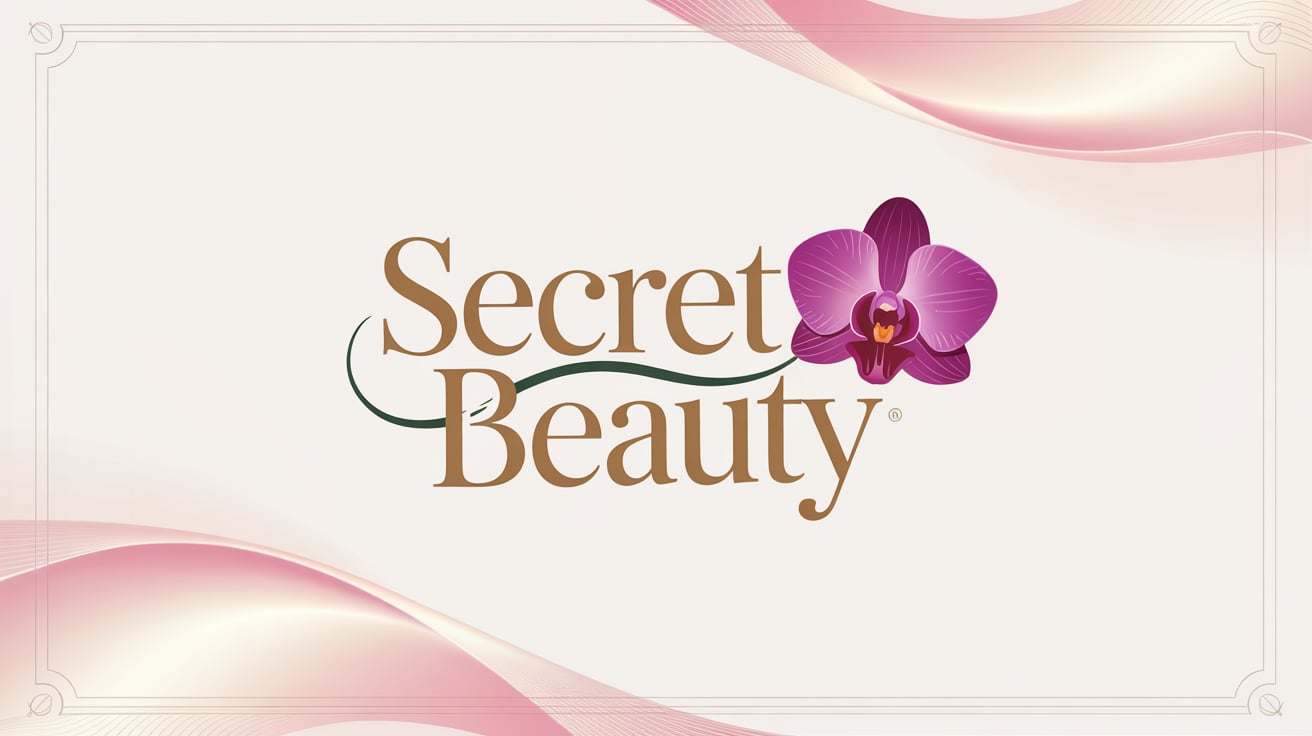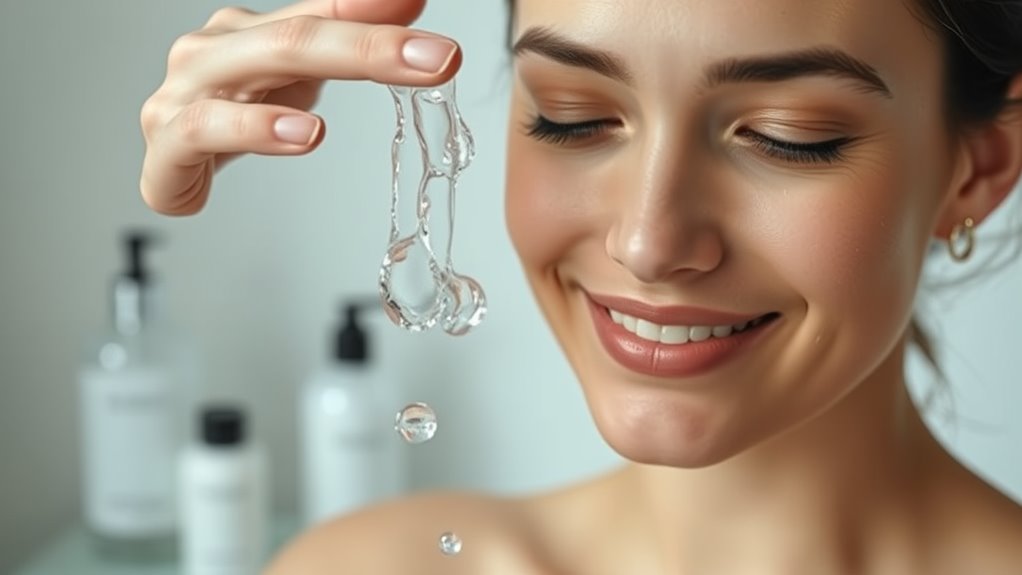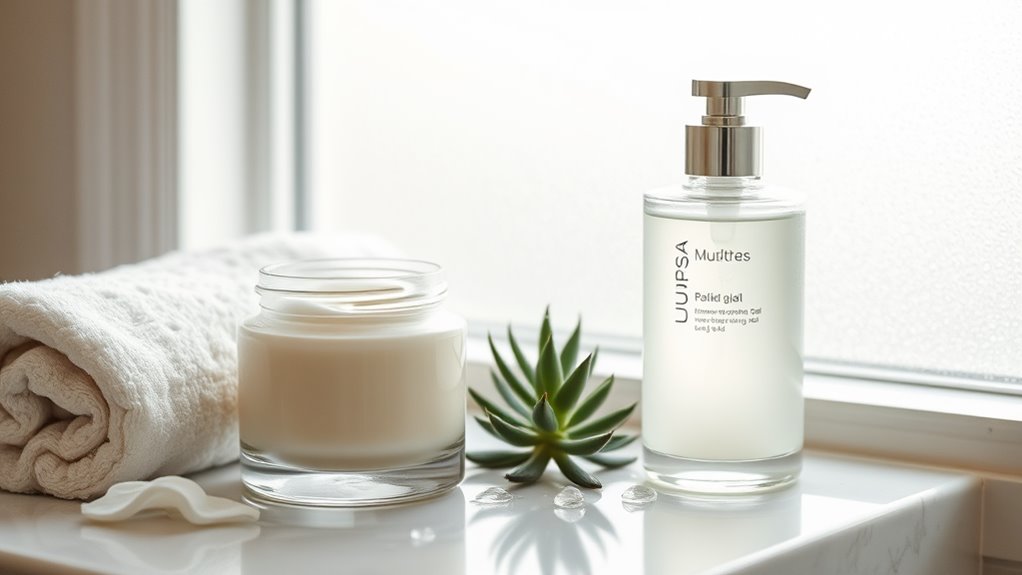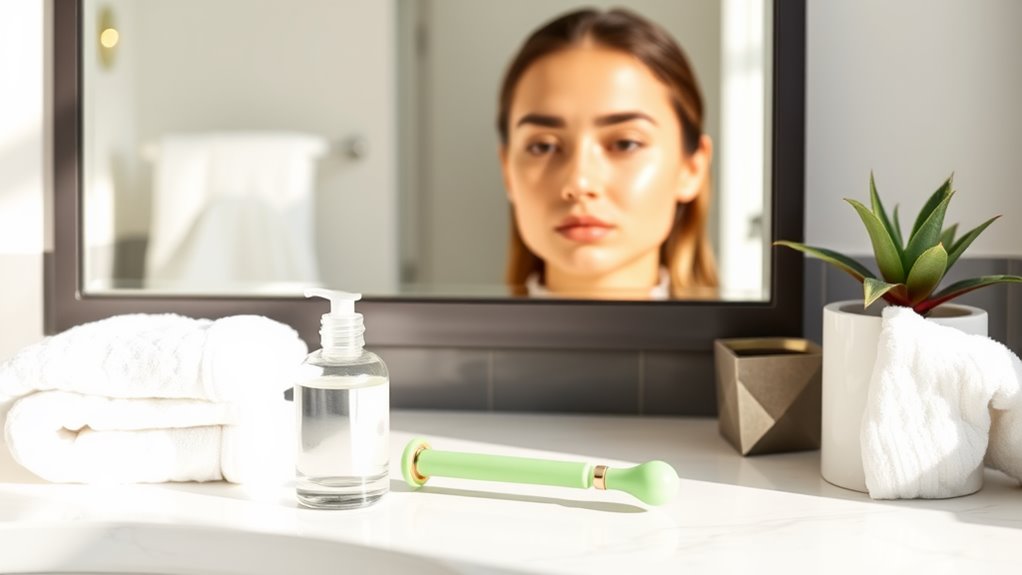You’re Probably Washing Your Face Wrong-Fix It Now
You might be washing your face wrong, and it could be harming your skin. Using hot water strips essential oils, and rushing through cleansing can leave dirt behind. Make sure to pick the right cleanser for your skin type and massage it in for at least 30 seconds. Remember to moisturize afterward and always use sunscreen. If you want to uncover more about effective techniques and skincare tips, the following sections will provide valuable insights.
Key Takeaways
- Use lukewarm water to cleanse your face; hot water strips natural oils, causing dryness.
- Massage cleanser on dry skin for at least 30 seconds before rinsing.
- Choose a cleanser suited to your skin type for optimal results.
- Always wash your hands before applying products to your face.
- Pat your face dry with a clean towel and follow with moisturizer or toner.
Common Face-Washing Mistakes
Have you ever wondered if you’re washing your face the right way? Many people make vital face wash mistakes that hinder their skin’s health.
For starters, using hot water can strip your skin of natural oils, leading to dryness. Instead, opt for lukewarm water for a gentler cleanse.
Another common mistake isn’t applying enough product; a pea-sized amount isn’t sufficient for effective cleansing. You might also rush through the process, failing to massage the cleanser into your skin for at least 30 seconds.
Finally, don’t forget to wash your hands before touching your face. By recognizing these face wash mistakes, you can elevate your skincare routine and achieve a truly radiant complexion. Additionally, proper cleansing techniques are essential for maintaining skin health.
Mastering this step is essential for your skin’s overall health.
Choosing the Right Cleanser
Understanding common face-washing mistakes sets the stage for selecting the right cleanser for your skin type.
First, identify your skin type: oily, dry, combination, or sensitive. For oily skin, opt for a gel or foaming cleanser that removes excess oil without stripping your skin’s barrier.
If you have dry skin, choose a creamy or hydrating cleanser packed with nourishing ingredients.
Combination skin can benefit from a gentle gel cleanser that balances both oil and moisture.
For sensitive skin, look for fragrance-free, soothing cleansers with calming ingredients like aloe or chamomile.
Always read labels and avoid harsh sulfates or irritants. Additionally, it’s beneficial to follow a proper facial cleansing technique to ensure your skin receives the best care possible.
The Importance of Water Temperature
When washing your face, the temperature of the water you use can greatly impact your skin. Using the right water temperature can enhance your cleansing routine, ensuring your skin looks and feels its best.
Consider the following:
-
Warm water opens pores, allowing for deeper cleansing.
-
Cool water tightens pores, helping to reduce excess oil and minimize blemishes.
-
Extreme temperatures can irritate and damage your skin barrier, leading to dryness or breakouts.
-
Finding the right balance fosters a rejuvenating experience, making your skincare routine enjoyable. Additionally, using an effective cleansing routine can further improve the results of your skincare regimen.
Proper Washing Technique
Mastering the proper washing technique can elevate your skincare routine and promote healthier skin.
Start by applying a gentle cleanser to dry skin, using your fingertips to massage it in circular motions. This helps break down makeup and impurities effectively. Don’t rush—spend at least 30 seconds on this step.
Next, dampen your hands with lukewarm water and continue massaging to emulsify the cleanser. Rinse thoroughly, ensuring no residue remains, as this can cause irritation.
Pat your face dry with a clean towel, avoiding aggressive rubbing. Finally, follow up with a suitable toner or moisturizer to lock in hydration. Incorporating the Korean double cleansing method into your routine can further enhance the effectiveness of your cleansing process.
Frequency of Cleansing
Cleansing your face daily is essential for maintaining healthy skin, but how often you should wash depends on your skin type.
If you have oily skin, more frequent cleansing might be beneficial, while dry or sensitive skin may need a gentler approach.
Understanding your skin’s needs will help you find the right balance for a fresh, radiant complexion.
Daily Cleansing Importance
Though you might think washing your face is just a daily chore, it plays an essential role in maintaining your skin’s health. Cleansing your face daily helps remove impurities, excess oil, and dead skin cells, which can lead to breakouts and dullness.
By establishing a regular cleansing routine, you’re not just improving your appearance; you’re investing in your skin’s long-term well-being.
Consider these benefits of daily cleansing:
- Minimizes acne: Reducing clogged pores prevents breakouts.
- Enhances glow: A clean canvas allows your skin to radiate.
- Boosts product absorption: Cleansed skin absorbs serums and moisturizers better.
- Promotes confidence: Healthy skin elevates your self-esteem.
Make daily cleansing a non-negotiable part of your skincare regimen!
Skin Type Considerations
Understanding your skin type is essential when determining how often you should wash your face.
If you have oily skin, cleansing twice daily helps remove excess sebum and prevents breakouts.
For those with dry or sensitive skin, once in the morning and once at night may suffice, using a gentle cleanser to avoid irritation.
Combination skin benefits from a tailored approach—consider washing the oily areas more frequently while being gentler on drier patches.
If your skin’s prone to acne, a specialized cleanser used consistently can enhance results.
Always listen to your skin; if it feels tight or irritated, adjust your routine.
Mastering your cleansing frequency based on your unique skin type is the key to a balanced, healthy complexion.
Aftercare: Moisturizing and Protecting
After washing your face, it’s important to hydrate your skin to maintain its balance and health. Choosing the right moisturizer tailored to your skin type can make all the difference, while sun protection is necessary for preventing damage. Furthermore, incorporating essential steps in your aftercare routine can enhance the overall effectiveness of your skincare regimen. Let’s explore how to effectively care for your skin after cleansing.
Importance of Hydration
Hydration is essential for maintaining healthy, radiant skin, especially after washing your face. When you cleanse your skin, you strip away natural oils, making it important to replenish moisture immediately. Proper hydration helps your skin barrier function effectively and prevents dryness or irritation.
Consider these emotional benefits of staying hydrated:
- Feel confident with smooth, supple skin.
- Experience fewer breakouts as hydration balances oil production.
- Enjoy a youthful glow**** that radiates energy.
- Reduce signs of aging, keeping your skin looking fresh.
Incorporating hydration into your skincare routine won’t only enhance your complexion but also elevate your self-care ritual, setting you on the path to mastering your skincare game.
Choosing the Right Moisturizer
Finding the right moisturizer can make a significant difference in how your skin feels and looks after washing.
Start by evaluating your skin type—whether it’s oily, dry, or combination—so you can choose a formula that caters to your specific needs. Look for ingredients like hyaluronic acid for hydration, glycerin for moisture retention, and ceramides for barrier support.
If your skin’s prone to breakouts, opt for non-comedogenic products. For those with sensitive skin, fragrance-free options are essential.
Apply your moisturizer while your skin is still slightly damp to lock in moisture effectively.
Sun Protection Essentials
One essential step in your skincare routine is sun protection, which can’t be overlooked. You might think your moisturizer is enough, but it’s vital to apply a dedicated sunscreen daily.
Protecting your skin from harmful UV rays prevents premature aging, sunburn, and serious conditions like skin cancer. Here’s what you need to remember:
- Broad-spectrum SPF 30 or higher is a must.
- Apply it generously—don’t skimp!
- Reapply every two hours, especially after swimming or sweating.
- Don’t forget areas like your ears, neck, and scalp.
Mastering sun protection will keep your skin radiant and youthful.
Incorporate these essentials into your aftercare routine, and you’ll notice the difference. Your skin deserves the best defense against the sun!
When to Seek Professional Advice
When should you consider seeking professional advice for your skincare routine? If you notice persistent skin issues like acne, eczema, or unusual discoloration, it’s time to consult a dermatologist.
They can help you identify underlying causes and recommend tailored treatments. If over-the-counter products aren’t delivering results, don’t hesitate to reach out for expert guidance.
Additionally, if you’re unsure about your skin type or the right products for your needs, a professional can provide clarity and direction.
Another significant moment is when you experience severe reactions to products, such as swelling or rashes; immediate advice is essential.
Ultimately, investing in professional insight can elevate your skincare mastery and lead to healthier, more radiant skin.
Frequently Asked Questions
Can I Wash My Face With Just Water?
You can wash your face with just water, but it may not remove dirt or oil effectively. For better results, consider using a gentle cleanser that suits your skin type for ideal cleanliness and health.
Is It Necessary to Use a Toner After Cleansing?
Using a toner after cleansing isn’t strictly necessary, but it can enhance your routine. It helps balance your skin’s pH, removes leftover impurities, and prepares your skin for better absorption of serums and moisturizers.
Should I Exfoliate Before or After Washing My Face?
Exfoliating before washing your face removes dead skin, enhancing your cleanser’s effectiveness. This process allows your cleanser to penetrate deeper, ensuring a more thorough clean. So, start with exfoliation for ideal results in your skincare routine.
How Do I Know if My Cleanser Is Too Harsh?
To determine if your cleanser’s too harsh, pay attention to your skin. If it feels tight, dry, or irritated after washing, it’s likely too strong. Opt for gentler formulas that maintain your skin’s natural balance.
Can I Use Body Wash on My Face?
You shouldn’t use body wash on your face. It’s formulated for tougher skin and can strip your face’s natural oils, leading to irritation or dryness. Stick to a gentle facial cleanser for best results.





